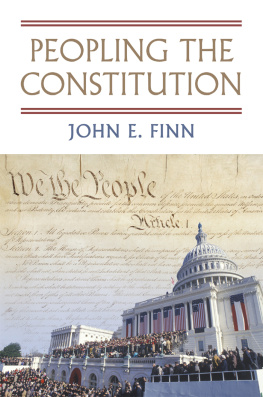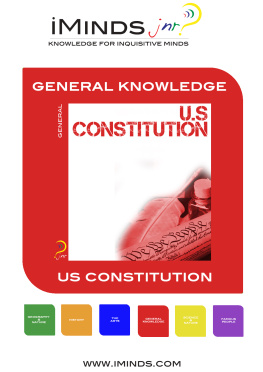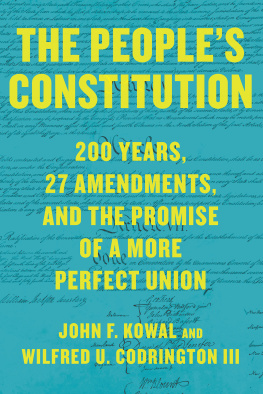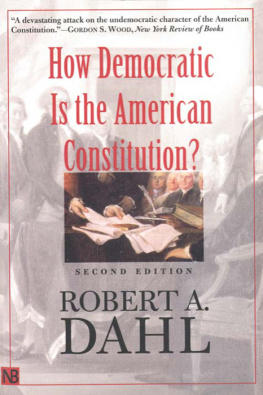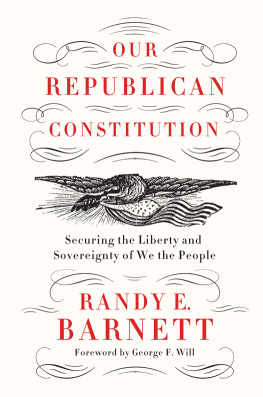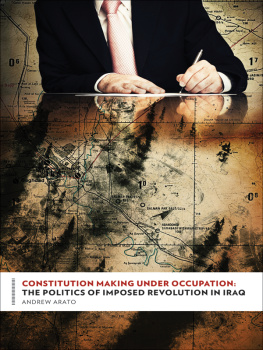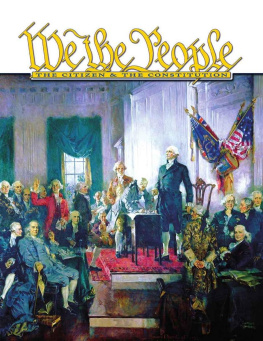2014 by the University Press of Kansas
All rights reserved
Published by the University Press of Kansas (Lawrence, Kansas 66045),
which was organized by the Kansas Board of Regents and is operated
and funded by Emporia State University, Fort Hays State University,
Kansas State University, Pittsburg State University, the University of
Kansas, and Wichita State University
Library of Congress Cataloging-in-Publication Data
Finn, John E., author.
Peopling the constitution / John E. Finn.
pages cm. (Constitutional thinking)
Includes bibliographical references and index.
ISBN 978-0-7006-1962-7
1. Constitutional lawUnited States. I. Title.
KF4550.F55 2014
342.73'0011DC23
2013045168
British Library Cataloguing-in-Publication Data is available.
Printed in the United States of America
10 8 6 4 2 1 3 5 7 9
The paper used in this publication is recycled and contains 30
percent postconsumer waste. It is acid free and meets the minimum
requirements of the American National Standard for Permanence of
Paper for Printed Library Materials z39.48-1992.
FOR ALEX AND ELLERY
Reality leaves a lot to the imagination.
John Lennon
FOREWORD
There is hardly a political question in the United States which does not sooner or later turn into a judicial one. This famous observation is one of the most profound insights in Democracy in America, and it allowed Alexis de Tocqueville to show the world that modern democracies could overcome their natural tendency to succumb to majority tyranny. Democracies, he argued, tend to neglect forms and formalities and thereby gave free rein to the brute preferences of overbearing majorities. Majority tyranny could be precluded or ameliorated by democratic practices and institutions modeled on admirable aspects of aristocracy. A well-designed democracy could learn from aristocracy without becoming an actual aristocracy based on inherited social classes. These lessons from aristocracy could enable democracies to avoid their worst tendencies while enhancing the best attributes of democratic rule. The American institution he held in highest esteemhis surrogate for an aristocracy within a democracywas the legal system, lawyers and judges.
Tocquevilles prediction that political reasoning would be supplanted by legal discourse and practice in American historical development could not have been more right. His prescience was truly stunning. Lawyers dominate the American political world today, and constitutional thinking is understood to be legal reasoning by nearly all citizens in the United States. However, Tocquevilles argument that this development would mark the maturation of a healthy democracy could not have been more wrong.
In the wide-ranging and probing book that you have before you, John Finn shows that the reliance on law, on the specialized language of lawyers, and on the assumption that constitutional questions require legal answerswhich Finn labels the Juridic Constitutionis the very source of Americas most serious political pathologies. Because the Juridic Constitution supplanted the Civic Constitutionan idea Finn first wrote about and a term he coined in an article published in 2001American citizens are now distanced from, and often ignorant about, politics, and American politicians are incapable of even discussing and identifying, let alone solving, the nations most serious political challenges. Features of legal reasoning that Tocqueville found so attractive, such as its reliance on specialized experts and on a technical language, depoliticized the American regime. Ordinary citizens retreated into their private worlds and left the practice of politics to lawyers or to politicians who deferred to lawyers and judges.
Ironically, the Juridic Constitution destroyed the constitutional vitality of another feature of American political life that both Tocqueville and John Finn agree is essential to the health of any well-designed democracyvoluntary associations and local political practices. Finn shows that these Tocquevillian practices are better understood as necessary features of the Constitution itself than as the cultural conditions for a Constitution understood as a legal instrument above and outside of society and the private sphere. It is in the associative life that Tocqueville so admired that constitutional thinking is best taught, learned, and practiced. Tocqueville failed to see how his ersatz aristocracy would sap democratic vitality and diminish the meaning and practice of citizenship.
John Finn makes the case for a civic understanding of constitutional theory and for a constitutional understanding of civic education. He returns constitutional theory to its political roots, and he develops a constitutional capacity for civic education. Although the Juridic Constitution has been very harmful to American political health, Finn does not argue that it should be eliminated. Rather he offers a capacious view of the Constitution and of constitutional theory in which both the Civic and Juridic Constitutions have their rightful places. Because the Juridic Constitution looms so large in contemporary America, Finn devotes most of his attention in this book to developing the civic alternative.
In developing a systematic account of the Civic Constitution, Finn draws upon much work by others who share a view of the Constitution as a political design containing a legal order within it. Some have labeled this political orientation the Princeton School of constitutional theory because many scholars working in this tradition were colleagues or students of Walter Murphy, a very influential Princeton professor with whom Finn himself studied. The Princeton School sought to develop an extrajudicial constitutional point of view, and it drew upon work in political science, political theory, and other disciplines. In addition to his own clear and original argument, one of the wonderful merits of John Finns book is that it offers the best synthesis of this larger ambit of work and it brings the fruits of the Princeton School into conversation with leading juridical constitutional theorists in the legal academy. Finn prosecutes his thesis in a way that serves as a superb introduction to the entire field of constitutional theory and to the writings of political and social theorists of education and civic life.
The book is divided into three large sections that would reflect the principal concerns of a political architect: the founding, maintenance, and potential failure of political regimes. One could describe this orientation as Aristotelian because Finn looks at American politics as a whole, as a regime. Modern liberal democracies, and the scholars within them, tend to view and interpret politics from some part of the wholesuch as the economy, legal system, or culturebecause one of the hallmarks of modern politics is the separation of the private sphere from public life. Even though we rightly value privacy and individual liberty, Finn shows that the Constitution and public life necessarily superintend or configure the so-called private sphere. Thus, a perspective on the whole regime is as necessary in modern America as it was in ancient Athens. John Finns articulation of the Civic Constitution offers a cogent regime perspective for our time.

